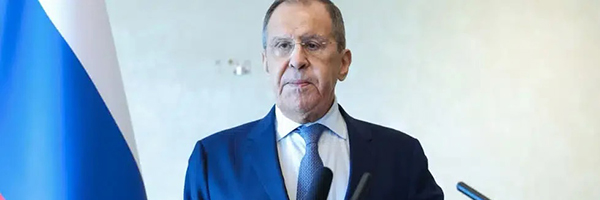Lavrov Sent the Clearest Signal Yet That Russia Is Interested in Freezing the Proxy War
 Andrew Korybko, Orinoco Tribune, June 23, 2023 —
Andrew Korybko, Orinoco Tribune, June 23, 2023 —
If the Kremlin preferred to keep its special operation going until Russian troops reach the Polish border, then Lavrov wouldn’t have just complained about the NATO chief being against the scenario of freezing their proxy war in Ukraine.
Many in the Alt-Media Community are certain that the NATO-Russian proxy war in Ukraine won’t end until the special operation reaches the Polish border, but this forecast contradicts what President Putin and Foreign Minister Lavrov recently signaled about the Kremlin’s interest in freezing this conflict. The first suggested that pragmatic outcome during a series of appearances last week that were analyzed here, while the second extended credence to his boss’ strong innuendo just several days later.
Russia’s top diplomat said on Tuesday that “If NATO, through the mouth of Stoltenberg, once again declares that they are against freezing, as they say, the conflict in Ukraine, then they want to fight. Well, let them fight, we are ready for this, we have long understood the goals of NATO in the situation around Ukraine, which have been formed for many years.” This is the clearest confirmation yet that Russia is ready to compromise on its maximalist goals if certain conditions related to its security are first met.
After all, if the Kremlin preferred to keep its special operation going until Russian troops reach the Polish border, then Lavrov wouldn’t have complained about the NATO chief being against the scenario of freezing their proxy war in Ukraine. This implies that President Putin was sincere last week when he said that peace talks with Ukraine could be revived on the basis of their now-defunct draft treaty in the event that the US cuts off Kiev’s arms supply.
Regrettably, Stoltenberg’s subsequent insistence on keeping the conflict going shows that the bloc isn’t ready to countenance a compromise with Russia, at least not yet. Kiev’s NATO–backed counteroffensive will likely continue for the next few weeks despite colossally failing thus far because ending it before the alliance’s summit next month in Vilnius could shatter the West’s already fraught unity. After that, however, the US will be forced into the fateful choice of either escalating or de-escalating this proxy war.
Russia’s edge in its “race of logistics”/”war of attrition” with NATO that Stoltenberg finally acknowledged in mid-February is President Putin’s main argument in favor of freezing the conflict, but the US’ ruling liberal–globalist elite might escalate out of desperation to coerce concessions from it before then. The first scenario is pragmatic but carries with it political and reputational costs for the West, while the second is reckless because it spikes the risk of World War III breaking out by miscalculation.
Belarusian President Lukashenko hinted last week that he expects Belgorod-like proxy incursions against his country, which followed former NATO chief Rasmussen predicting that Poland might directly intervene in Ukraine if Kiev isn’t satisfied with whatever’s offered to it at the bloc’s summit next month. Both possibilities as well as the one of Ukraine’s forthcoming F-16 fleet being based in a NATO country could result in the escalation that Lavrov said that Russia is ready for if the bloc decides to go that route.
Be that as it may, his country would clearly prefer for its opponents to freeze their proxy war, ergo why he complained about how Stoltenberg’s latest comments showed that NATO is against this scenario. Those who follow Russian affairs must acknowledge the Kremlin’s interest in having this happen even if their explanation is different than the one shared in the present analysis. Denying the sincerity of President Putin’s proposal from last week or spinning it as part of a “5D chess” plan is dishonest.
